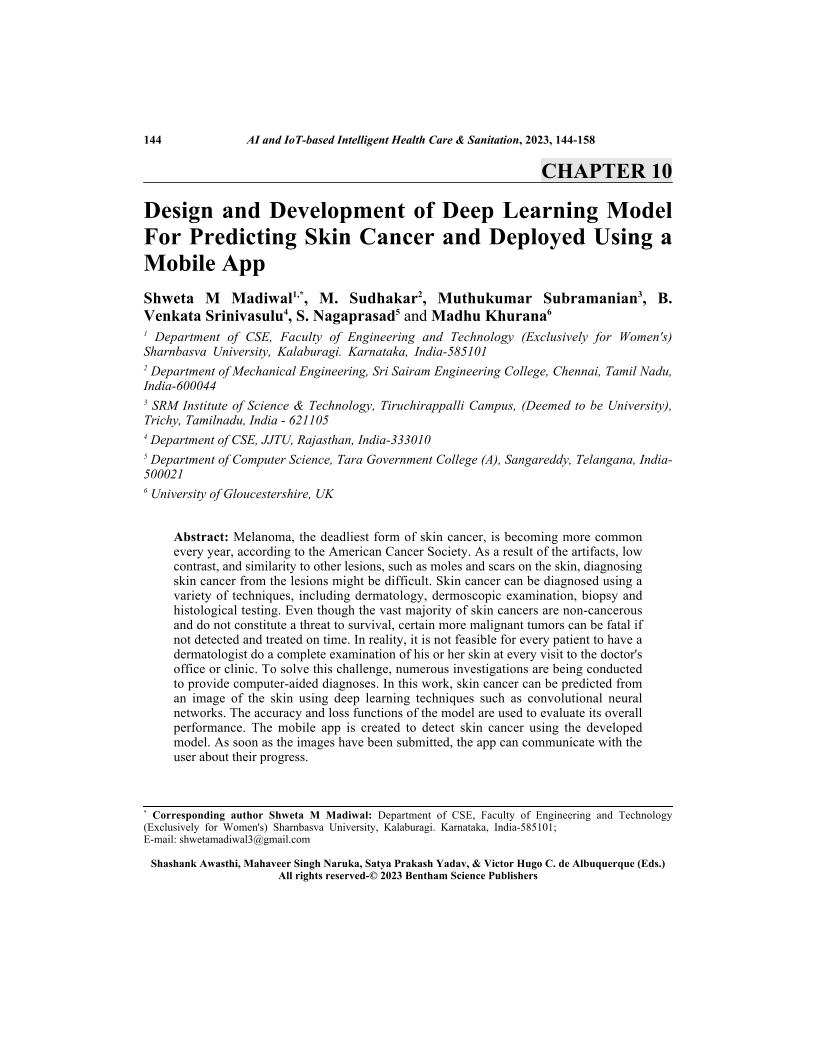Design and Development of Deep Learning Model For Predicting Skin Cancer and Deployed Using a Mobile App

- Authors: Shweta M Madiwal1, M. Sudhakar2, Muthukumar Subramanian3, B. Venkata Srinivasulu4, S. Nagaprasad5, Madhu Khurana6
-
View Affiliations Hide Affiliations1 Department of CSE, Faculty of Engineering and Technology (Exclusively for Women's) Sharnbasva University, Kalaburagi. Karnataka, India 585101 2 Department of Mechanical Engineering, Sri Sairam Engineering College, Chennai, Tamil Nadu, India-600044 3 SRM Institute of Science & Technology, Tiruchirappalli Campus, (Deemed to be University), Trichy, Tamilnadu, India - 621105 4 Department of CSE, JJTU, Rajasthan, India-333010 5 Department of Computer Science, Tara Government College (A), Sangareddy, Telangana, India-500021 6 University of Gloucestershire, UK
- Source: AI and IoT-based intelligent Health Care & Sanitation , pp 144-158
- Publication Date: April 2023
- Language: English
Design and Development of Deep Learning Model For Predicting Skin Cancer and Deployed Using a Mobile App, Page 1 of 1
< Previous page | Next page > /docserver/preview/fulltext/9789815136531/chap10-1.gif
Melanoma, the deadliest form of skin cancer, is becoming more common every year, according to the American Cancer Society. As a result of the artifacts, low contrast, and similarity to other lesions, such as moles and scars on the skin, diagnosing skin cancer from the lesions might be difficult. Skin cancer can be diagnosed using a variety of techniques, including dermatology, dermoscopic examination, biopsy and histological testing. Even though the vast majority of skin cancers are non-cancerous and do not constitute a threat to survival, certain more malignant tumors can be fatal if not detected and treated on time. In reality, it is not feasible for every patient to have a dermatologist do a complete examination of his or her skin at every visit to the doctor's office or clinic. To solve this challenge, numerous investigations are being conducted to provide computer-aided diagnoses. In this work, skin cancer can be predicted from an image of the skin using deep learning techniques such as convolutional neural networks. The accuracy and loss functions of the model are used to evaluate its overall performance. The mobile app is created to detect skin cancer using the developed model. As soon as the images have been submitted, the app can communicate with the user about their progress.
-
From This Site
/content/books/9789815136531.chap10dcterms_subject,pub_keyword-contentType:Journal -contentType:Figure -contentType:Table -contentType:SupplementaryData105

